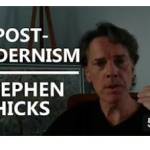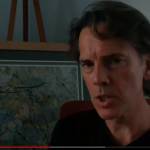Our discussion is embedded below or at YouTube.
Topics discussed:
1:00: The various uses of “postmodern”
3:30: The epistemology of reason in early modern philosophy
4:30: Pomo as a skepticism about reason by mid-1900s
5:00: Individualism in early modern philosophy
7:00: Pomo as a reaction to individualism
7:30: Social-psychological-linguistic determinisms of mid-1900s
10:10: Perception and language as “obstacles” and consequent subjectivity
11:00: Cultural manifestations of pomo in art, politics, education
12:45: Psychology and cognition
15:00: It’s implicit premises that can “kill” you in philosophy
18:45: Why is reason important?
21:00: On the limitations of perception
25:10: Conceptualizing the causal processes of perceptions
28:40: Gibson versus Kant: registering versus structuring
30:10: David Kelley and Harry Binswanger mention
32:00: Perceptual form and function
34:00: The influence of pomo and the Enlightenment’s flaws
39:30: Implications of the Is-Ought dichotomy
41:00: C.P. Snow and the “two cultures”
43:00: Pomo’s use of the Is-Ought dichotomy: expressivism and clashing social groups
44:00: The politics of pomo
44:50: Philosophy as rationalization of political commitments
46:30: The historical context of the 1950s: post-Depression, post-WWII, post-100 years of Marxist predictions
47:30: Classical Marxism’s claims, predictions, and actual results
51:10: Crises of faith, religious and political versions
55:00: The birth of pomo out of the marriage of skepticism and a crisis of political faith
55:40: Left politics needs a new strategy
56:30: A sequel to Explaining Postmodernism?














Don’t take classes from profs who tell you there is no objective reality. Find something better to do with your life.